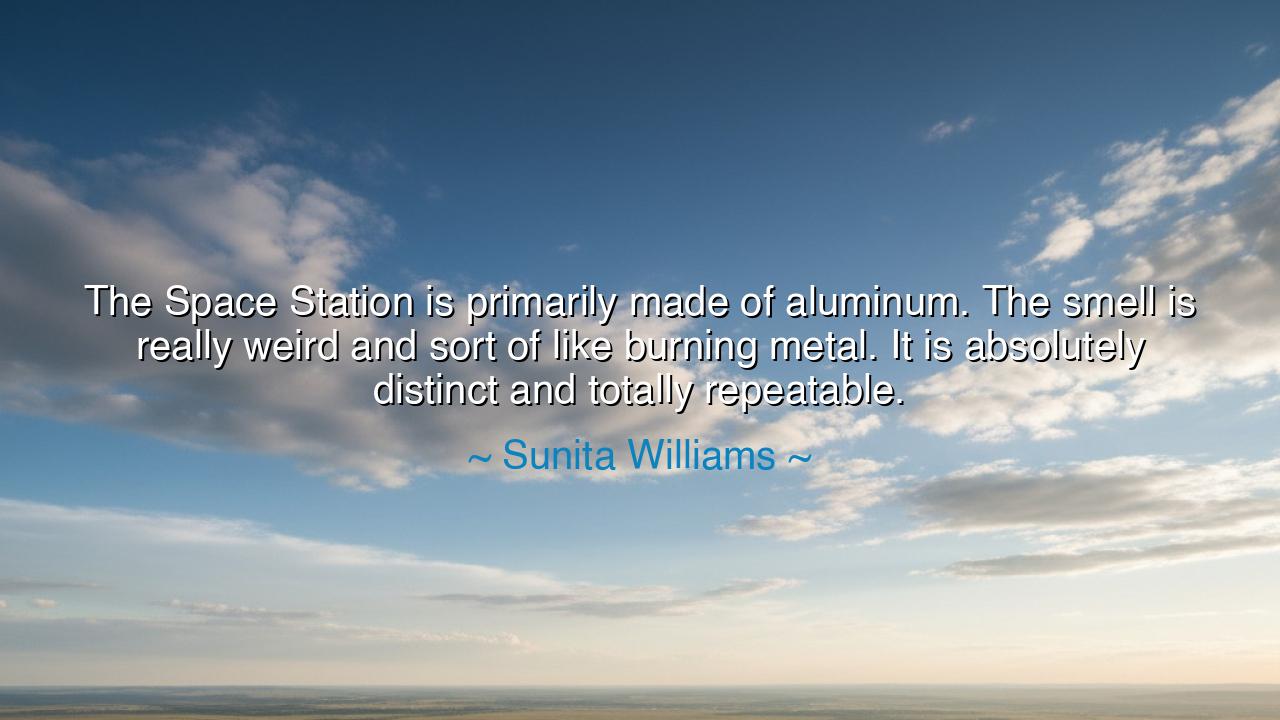
The Space Station is primarily made of aluminum. The smell is
The Space Station is primarily made of aluminum. The smell is really weird and sort of like burning metal. It is absolutely distinct and totally repeatable.






Listen, O children of the future, for the words of Sunita Williams take us to the very frontiers of human experience, where the limits of the known world are stretched into the vast emptiness of space. She said, “The Space Station is primarily made of aluminum. The smell is really weird and sort of like burning metal. It is absolutely distinct and totally repeatable.” These words, though simple in their description of the International Space Station, carry with them a deep truth about the nature of discovery—that in the vast unknown, we are often confronted with the unexpected, the distinct, and the unfamiliar. Williams offers us a glimpse into the lived experience of venturing into space, where even the most ordinary materials take on an entirely new character.
In the ancient world, explorers ventured into unknown lands, and the first of their kind to reach distant shores were met with strange sights and smells, just as Williams experienced the metallic scent of the space station. Homer’s Odyssey tells the story of Odysseus, whose journey across the seas was filled with encounters of the unfamiliar. The ocean, for the ancient Greeks, was a vast, mysterious force, and the lands beyond the horizon were filled with both wonder and danger. Each new place brought with it new sensations, new smells, and new challenges, much like the unknown experiences that await those who journey beyond Earth’s atmosphere. Just as the ancient explorers could never have known what to expect from the distant lands they discovered, so too do the astronauts of today step into the unknown, where even the air is different, and the very materials they encounter—like the aluminum in the space station—carry new qualities and meanings.
The Space Station, though built with materials familiar to us on Earth, presents a wholly new environment where even the commonplace becomes extraordinary. Williams describes the burning metal smell as something that is "totally repeatable," suggesting that the experience of space, though alien, is not just a fleeting moment but a constant—something that can be expected and relied upon. This idea of repeatability speaks to the nature of science and discovery. Just as the ancient philosophers sought truths that could be relied upon—whether in the study of the heavens by Pythagoras or the principles of geometry by Euclid—so too do modern scientists seek reliable, repeatable experiences, even in the most unexpected places. The scent of burning metal on the Space Station, though strange, is part of a process of uncovering the laws of nature, a constant reminder that the universe operates with its own set of principles, waiting to be understood.
There is, however, a deeper meaning in Williams’s description, one that touches upon the very human experience of exploration. When we embark on journeys into the unknown—whether to faraway lands or the depths of space—we do so not just to conquer, but to encounter something greater than ourselves. The metallic smell of the space station is a marker of this encounter, a tangible connection to the alien and the unfamiliar. It is a reminder that every journey of exploration is not just about reaching new places, but about transforming ourselves in the process. Just as Marco Polo returned from the East with new knowledge and a deeper understanding of the world, so too do astronauts return from space with a transformed perspective, not just on the universe, but on what it means to be human.
The lesson here, O children of the future, is that the unknown is not to be feared, but embraced. Williams speaks not only of the experience of space travel, but of the human spirit’s willingness to face what is unfamiliar with curiosity and courage. The strange and the new—whether it is the scent of burning metal in space or the discovery of new lands—should not turn us away, but draw us closer to understanding the mysteries that lie beyond our reach. Exploration is a call to face the discomfort of the unfamiliar, to grow and expand our understanding, and to find beauty even in the oddest of experiences.
Just as the ancient explorers ventured into unknown territories, pioneers of today, like Williams and her fellow astronauts, venture into the vast expanse of space. Each encounter—whether it is a new smell, a new sensation, or a new discovery—adds to our shared understanding of the world and the universe. The lesson is clear: embrace the unfamiliar, for it is in these encounters that the greatest discoveries are made. Whether you are journeying into the realms of space or the depths of your own soul, know that the unknown holds within it the possibility of growth and transformation.
So, O children of the future, take this wisdom into your own lives. Embrace the unfamiliar, and do not fear the strange experiences that life may bring. Like Sunita Williams, let your spirit of adventure carry you into the unknown with curiosity, courage, and a readiness to find beauty even in the most unexpected places. For it is through these experiences that you will come to know not just the world around you, but the depth of your own humanity. Let the unknown become a friend that guides you to new insights, new truths, and a greater understanding of the vast universe we are all part of.






AAdministratorAdministrator
Welcome, honored guests. Please leave a comment, we will respond soon